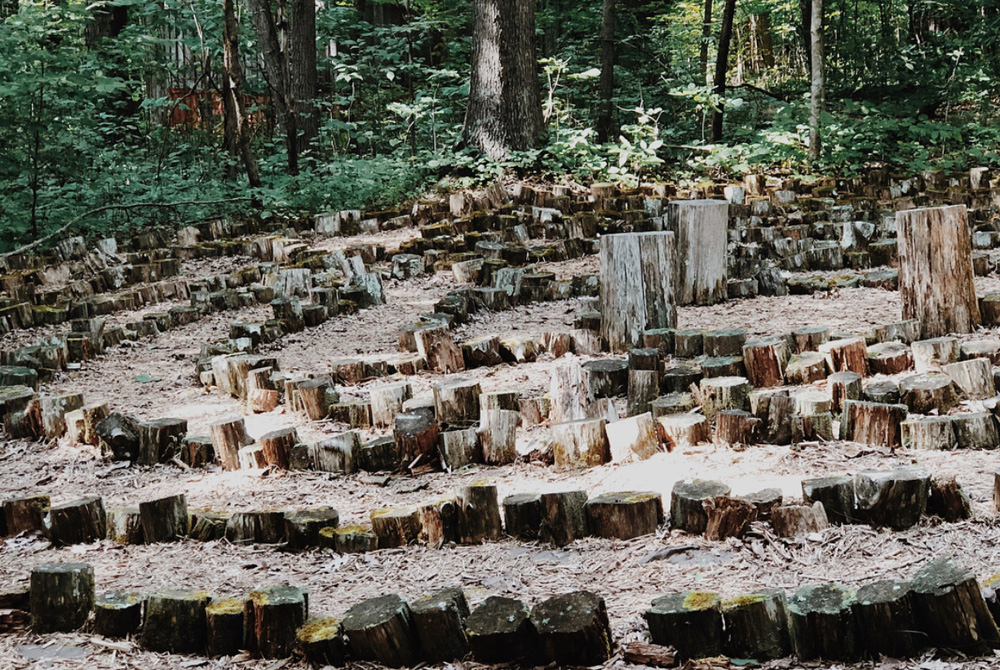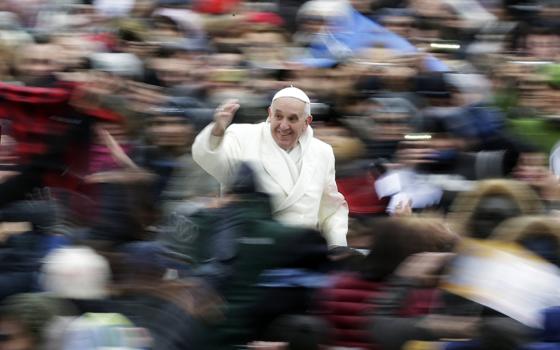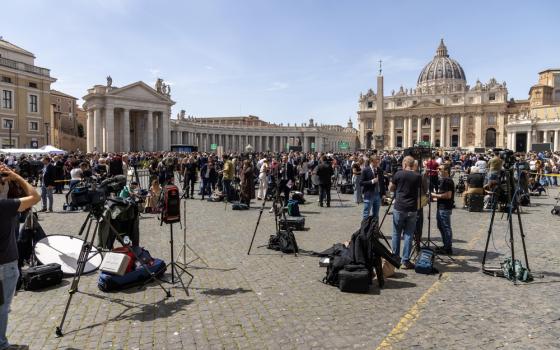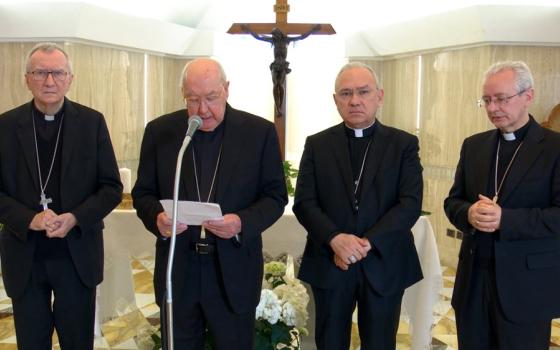
The labyrinth at the Cedars of Peace retreat center in Nerinx, Kentucky (Photo courtesy of Amy Maltz)
When the Catholic sexual abuse crisis came into the spotlight in the Boston area, and the institutional scope of its cover-up was publicly unfolding, my Catholic father quit his job to devote his life to researching and documenting it. In 2003, when I was 7, he co-founded an organization called Bishop Accountability, which is now the primary independent source of information on international clergy abuse, with the goal of assembling an online collection of every publicly available document and account of the crisis.
My dad, being acutely aware of the implications of the allure and power of Catholicism, particularly on young people, didn't want my brother and me to be enmeshed in an institution that he knew to be committing violent crimes against children. As a result, we spent more of my childhood outside churches holding picket signs than inside of them.
Admittedly, by the time I could begin to wrap my developing mind around the scale of what was happening in the Catholic Church, and because I was exposed to an intimate account of the crisis through Dad's work, I was faithfully content having nothing to do with Sunday school or holy Communion. But as I grew up, against a backdrop of institutional rape and abuse of power, there was still something perturbingly mystical about the elements of Catholicism I was exposed to — my dad's rosary and icons, our neatly arranged Christmas crèche, the private first Communion I received because I wasn't allowed to participate in the class like other kids my age were.
Though I understandably positioned myself against organized religion in my teenage years, I ended up having formative experiences with faith in the periphery of my adolescence, most significantly when family friends hosted us at Passover Seders or when I attended the extravagant bat mitzvahs held in my hometown. Being community-minded from a young age, yet only being able to access spiritual fellowship from afar, I developed an association between estrangement and religion, silently longing for something to align myself with.
The moments in which I did experience communal worship were mostly isolated occasions that seated me as a guest at another God's table. But, every now and then, always in the loving presence of others — I would catch a glimpse of communion with something outside myself that resembled what I thought could be a religious experience — simultaneously all to myself and shared. These moments were amorphous, fleeting and removed from any creed or structure, but they were the start of a set of centering values I would continue to indirectly seek out as I got older.
In my sophomore year of college, I moved into a Jewish housing co-operative in Madison, Wisconsin, where my relationship with religion became substantially more tangible and fulfilling. There at Ofek Shalom, my 10 housemates and I celebrated Shabbat every Friday night with homemade challah and sometimes 30 people at our table. I instantly took to the traditions that guided our home — illustrating and hanging up a handwritten challah recipe in the kitchen, starting to prepare dinner as soon as my classes ended for the week, and inviting everyone I met over to celebrate.
I couldn't believe it was possible to gather so many immature and stressed-out college students in such a wholesome way on a regular basis. We were really just a bunch of kids who talked more about our disdain for organized anything (besides our own co-op, of course) than any sort of formalized relationship with God. Though in the glow of Shabbat candlelight, we ended our week together, animated by love and wine — more spiritually attune than I have ever seen in a group of anything. Hosting and participating in those dinners and finding myself in that vibrant interconnected world brought me as close to God as I had ever been, in a regenerative, organic space that reminded me of my dad's devotion to justice in a church he intended to repair for the future of the next generation of religious life. I was also acutely aware of how intertwined spirituality and friendship are, for me.
Advertisement
Somehow, while living at Ofek and finishing my undergraduate degree, I was drawn to a Catholic service program called the Loretto Volunteer Program. In the summer of 2018, after a very difficult transition away from my home in Madison, where I had seriously considered converting to Judaism and where my whole world had been planted, I traveled to Nerinx, Kentucky, for the annual Loretto Volunteer opening retreat, held at the Loretto Motherhouse, a now permanent home for over 100 Catholic nuns.
After a challenging week of vulnerability and connection, intended to familiarize our volunteer cohort with the four core values of the program: simple living, spirituality, social justice, and community, it hit me that, no matter how expansive Loretto spirituality is, I was about to embark on an explicitly Catholic way of life. A few hours before my new housemates and I were set to leave for St. Louis, it started to pour, and I set out on a walk alone, with the intention to process the change that was about to occur.
The Cedars of Peace retreat center is a cluster of cabins, built and maintained on the Motherhouse property. It lies in a wooded corner of the land, past cow pastures and cultivated strips of wildflowers and prairie grass. Tucked behind the cabins is a tiny chapel and humble labyrinth with walls made from small tree stumps and woodchips. Soaking wet and feeling unreal, I approached the entrance of the labyrinth, feeling the full gravity of the upcoming chapter of my life — physically distant from my co-operative family and uncomfortably close to the religion I had been born into, but unable to identify with.
I paused at the entrance and took stock of my spirit and a somatic inventory of my body. I was feeling small and unprepared for what had been built up for me over the course of the retreat — a new way of being that is both tied to my religious past, and to connection with others. I looked across the labyrinth to the center, which had welcomed so much hesitancy and unsteadiness, and thought of the uncertainty sisters had expressed they also felt coming to Loretto for the first time, some at age 16.
Another Loretto volunteer had shared with me, on a prior walk in the woods, that a labyrinth has no wrong turns. Supposedly, they require nothing of us but a commitment to wind onward through space and time.
As I began to walk, I fell into a rhythm of pausing at each turn of the path, feeling into my body, and sensing what areas needed attention. I was compelled to put one hand on my heart and another on my gut, subconsciously comforting areas of my body that have always felt strained and vulnerable. Countless joyful moments at Ofek — side conversation and gossip during Shabbat prayer, dinner on the porch in our Sukkah made of sheets on Sukkot, rambunctious Passover Seders, re-painting the Jewish history library on a rainy Sunday — all filled my mind as I stepped and paused. Each moment had in common an immense amount of love shared by the people in those sacred spaces. Somehow, the intensity of the rain on my head and shoulders allowed me to merge those recollections with the present moment and a promise of an intentional Catholic community that I had never fully acknowledged I desired.
In that moment, I knew there was no separation between my father's deep distrust in the church and my blind faith in a program that was supported by it. I realized there was also little space between my love for Judaism and my fear of Catholicism. And when I found myself back where I started on my path, with the rain dying down around me, I encountered a set of near-complete sensations of peace and communion with myself, looking forward to a new faith journey I knew I'd actually been on all along.
[Adele McKiernan is a graduate of the University of Wisconsin-Madison, where they studied history and integrated liberal studies. They are now a second-year Loretto volunteer in St. Louis working at Missouri Health Care for All, as a grassroots organizing fellow.]
Editor's note: We can send you a newsletter every time a Young Voices column is posted to NCRonline.org. Go to this page and follow directions: Newsletter sign-up.






